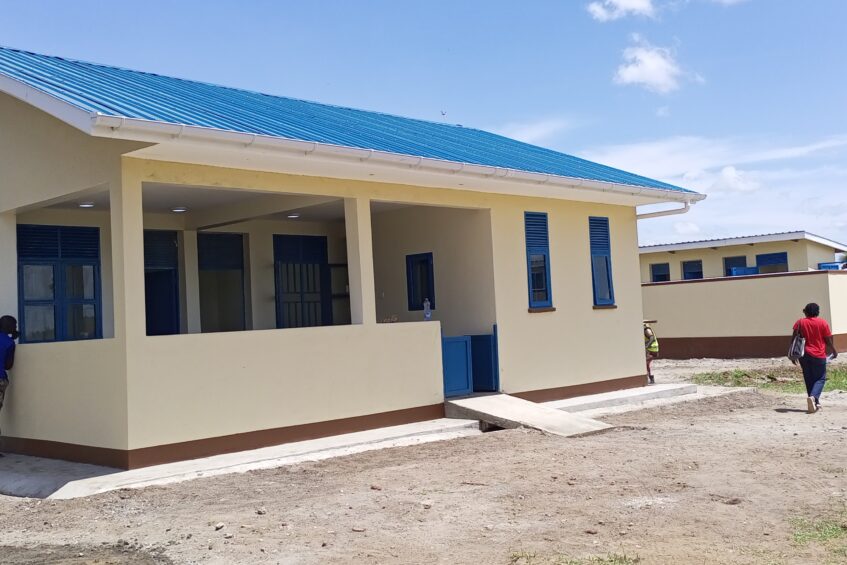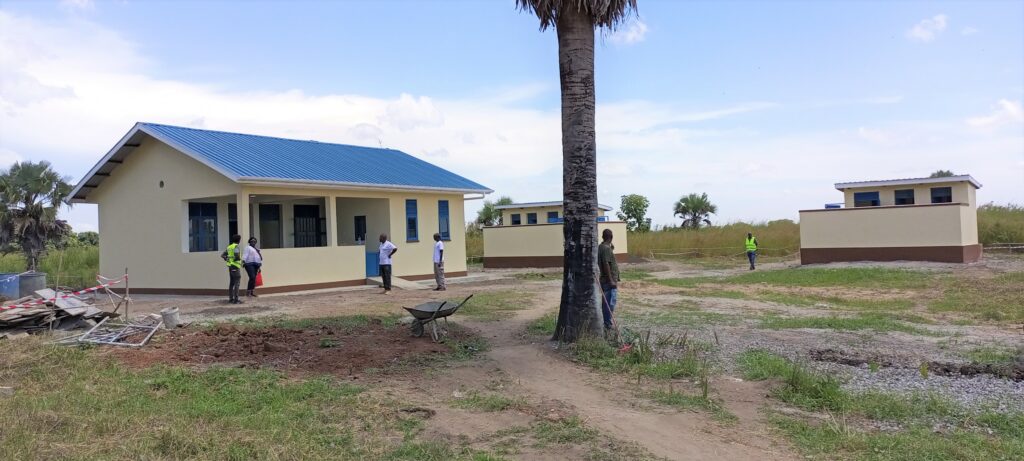You are here: Home | Featured | Health | Humanitarian | News | Gondokoro residents get new primary healthcare units

Miri Primary Healthcare Unit in Gondokoro Payam, Juba County, Thursday 27th Oct 2022. (Photo Credit: Charles Wote/Eye Radio).
Some residents of Gondokoro Payam in Juba County have welcomed the construction and handing over of two standard Primary Healthcare Units for the first time in their area.
The two PHCUs in Miri and Kango Boma were constructed through the World Bank’s Enhancing Community Resilience and Local Government Project.
“We are taking sick people from here up to Juba. Sometimes we don’t have transport and sometimes we are carry on head which can made a patient easily die.” said Olympia Lokak, a resident of Miri Boma.
The 47-year-old said the new facility will respond to health issues affecting the people especially during night hours.
“We never had facility like this one in the previous years even the government did not come and help us.”
“Now if a person is sick at night hours, he can get treatment here even our pupils if some of them are sick, they will get treatment that is why we are very happy about it.” Lokak told Eye Radio during an interview on Thursday.
According to the residents, Miri and Kango Boma of Gondokoro have gone for decades without healthcare facility leaving residents there struggle to transport their sick ones to Juba city for medical care.
In 2021, the government and development partners launched the Enhancing Community Resilience and Local Government Project to provide investments for community infrastructure.
It also included services prioritized by the communities, building inclusive and participatory community-led development.
Implemented by UNOPS and IOM on behalf of the government, the project is meant to benefit more than 630,000 citizens in 21 out of the 79 counties in the country.
Olimpio Lokak believes, if equipped, the new facility will reduce the burden of long-distant travel to access healthcare service.
“Here, we have sickness like malaria affecting us. We have diarrhea during rainy season and we have this waterborne disease like typhoid because we are drinking water from river Nile. So we need a community health worker to come and work here or doctor and we need medicines.” Lokak added.

Kango Boma Youth Leader Lino Ulang said the area, situated at about 22 kilometers in the eastern part of the capital Juba, has seen multiple outbreaks of waterborne diseases like cholera, typhoid and malaria.
“Gondokoro has so many diseases; sometimes you cannot get treatment for malaria, you cannot even get treatment for typhoid, the water from the river sometimes is dirty,” said the youth leader in an interview.
“Before, people use to go to Juba but if you are having a diarrhea, how do you go to Juba for treatment so this is really hard for you to reach Juba even during deliveries.”
Ulang attributed the spikes in diseases to proximity with the River Nile and the long distance covered to access Juba-based health services.
Welcoming the handing over of the newly constructed health facility, Ulang said “in the name of Almighty, I want to thank all those who contributed for the construction of this health facility, I really appreciate them.”
“This is the spirit we want because civilians are happy when there is a school. Civilians are happy if there is health facility and security because these are part of life.”
Before the 2013 civil war, the Ministry of Health and the World Health Organization said only few number of people in the country had access to health care service.
It added that the country only had about 1,500 medical doctors and two nurses attending to nearly 100,000 people.
For his part, Jacob Tangun, the Executive Chief of Kango Boma said the new facility is not capable to offer maternal health care in the area.
“We want maternity ward for women because this facility is for the treatment other diseases.”
“So to transport an expectant mother from here to Juba and there is no transport and the road is bad. So there are many sickness, we need drugs because you have handed it but there are no drugs if there are no drugs then there will be no work.”Chief Tangun explained during the handing over ceremony at Kango Boma.
According to the report, South Sudan is one of the countries with the highest number of women who die due to complications during or after delivery.
In the 2022/2023 financial year budget, health sector was allocated over 33 billion pounds to enable the government improve the country’s health system.
“We need support for this build which is now up. How to get drugs for the community, how to get the cadres let me say the technical personnel.” Said Daniel Alexander, a Clinical officer.
Alexander however appealed to the government to support the newly constructed facilities with supplies and manpower.
“Up to now Gondokoro does not have a midwife maybe nurses somewhere in Juba. I who is speaking now as a clinician, I sacrifice because this is my land I am supposed to be at the PHCC but if your community is suffering you can be there.”
“So we are appealing to you to at least look for the ways to support these facilities. If these facilities are not supported, and stuff are withdrawn from here, then the building remain.” He stressed.
In April this year, a multi-donor charity in the country withdrew funding leaving many healthcare centers in the country at a critical level.
Health Pooled Fund, the largest health care program in South Sudan, provide health services in eight out of the ten states.
The program was supporting nearly 8,000 health workers in 797 public health facilities, 25 hospitals, 195 Primary Health Care Centers and 577 Primary Health Care Units across the country.
Addressing Gondokoro residents, Juba County Executive Director Benneth Alex said he was not in better position to response to the concern on supplies and recruitment of manpower.
“For the issue of drugs, our county Director of Health is not present he would have responded to the issue of drugs but not only drugs but the person who is going to manage this facility because it needs somebody who will come and work here.”
“But we have challenge as the county authorities, there are chances for you as the citizens of Juba County to enroll for training in health programs but most of our people don’t want.” Alex told the gathering on Thursday.
Benneth Alex went on to encourage local population in Miri and Kango boma to take good care of the newly constructed facilities to enable them have access to affordable medical care close to them.
“UNOPS has done its part and it is your time now. They are not going to come from there again to come and protect this facility.”
“It is now your responsibility because it need somebody to clean and if fire is coming near here, it needs somebody to extinguish. So this is our responsibility because UNOPS has done its part and this is your time to work here.”
During his handing over remarks, Peter Mutoredzanwa, the Country Director for United Nations Office for Project Service (UNOPS) said the new facility is part of the project they are implementing in the country.
“UNOPS was trusted by the World Bank and government of South Sudan to construct infrastructure across the whole country. This is part of the infrastructure UNOPS constructed.”
“I want to emphasize that this project was donated to the government of South Sudan by the World Bank through the government.”
“We were contracted to do the work so we did not donate the project but we did the work so today we are all here to handover the projects to the authorities.” Mutoredzanwa added.
Support Eye Radio, the first independent radio broadcaster of news, information & entertainment in South Sudan.
Make a monthly or a one off contribution.
Copyright 2024. All rights reserved. Eye Radio is a product of Eye Media Limited.